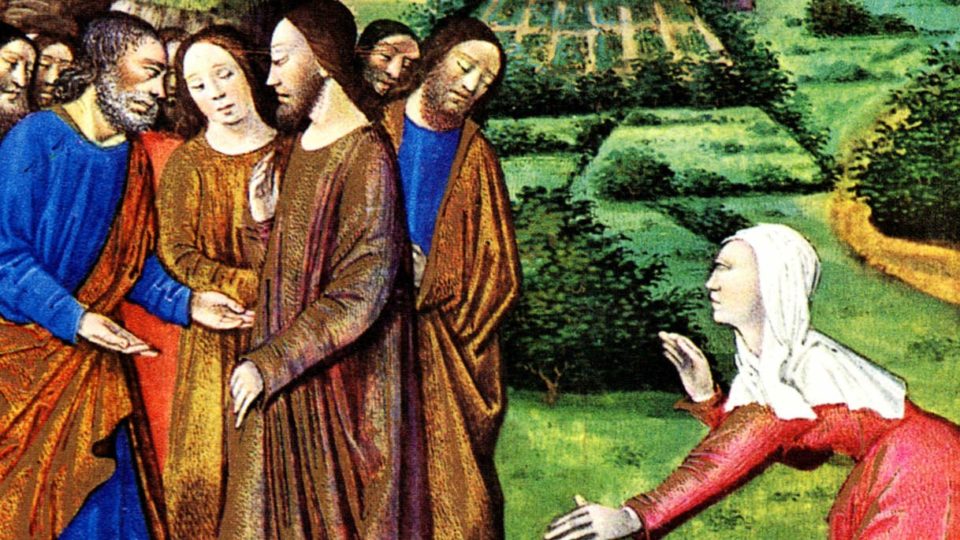DAILY MASS, GOSPEL AND COMMENTARY: THE CANAANITE WOMAN (Mt 15: 21–28).
GOSPEL OF WEDNESDAY, 18TH WEEK IN ORDINARY TIME (Mt 15: 21–28)
At that time Jesus withdrew to the region of Tyre and Sidon. And behold, a Canaanite woman of that district came and called out, “Have pity on me, Lord, Son of David! My daughter is tormented by a demon.” But he did not say a word in answer to her. His disciples came and asked him, “Send her away, for she keeps calling out after us.” He said in reply, “I was sent only to the lost sheep of the house of Israel.” But the woman came and did him homage, saying, “Lord, help me.” He said in reply, “It is not right to take the food of the children and throw it to the dogs.” She said, “Please, Lord, for even the dogs eat the scraps that fall from the table of their masters.” Then Jesus said to her in reply, “O woman, great is your faith! Let it be done for you as you wish.” And her daughter was healed from that hour.
GOSPEL COMMENTARY (from the Navarre Bible, Commentary to the Gospel of St. Matthew (with permission).
- 21-22 Tyre and Sidon were Phoenician cities on the Mediterranean coast, in present-day Lebanon. They were never part of Galilee but they were near its northeastern border. In Jesus’ time they were outside the territory of Herod Antipas (see note on Mt 2:1). Jesus withdrew to this area to escape persecution from Herod and from the Jewish authorities and to concentrate on training his Apostles.
- Most of the inhabitants of the district of Tyre and Sidon were pagans. St Matthew calls this woman a “Canaanite”; according to Genesis (10:15), this district was one of the first to be settled by the Canaanites; St Mark describes the woman as a “Syrophoenician” (Mk 7:26). Both Gospels point out that she is a pagan, which means that her faith in our Lord is more remarkable; the same applies in the case of the centurion (Mt 8:5-13).
- The Canaanite woman’s prayer is quite perfect: she recognizes Jesus as the Messiah (the Son of David) — which contrasts with the unbelief of the Jews; she expresses her need in clear, simple words; she persists, undismayed by obstacles; and she expresses her request in all humility: “Have mercy on me”. Our prayer should have the same qualities of faith, trust, perseverance and humility.
- 24 What Jesus says here does not take from the universal reference of his teaching (cf. Mt 28:19-20; Mk 16:15-16).
- Our Lord came to bring his Gospel to the whole world, but he himself addressed only the Jews; later on he will charge his Apostles to preach the Gospel to pagans.
- St Paul, in his missionary journeys, also adopted the policy of preaching in the first instance to the Jews (Acts 13:46).
- 25-28 This dialogue between Jesus and the woman is especially beautiful.
- By appearing to be harsh he so strengthens the woman’s faith that she deserves exceptional praise: “Great is your faith!” Our own conversation with Christ should be like that: “Persevere in prayer. Persevere, even when your efforts seem barren. Prayer is always fruitful” (St. Josemaria, The Way, 101).
VIDEO COMMENTARY ON TODAY’S GOSPEL
TOPIC: Do you know what persistent prayer and perseverance in your suffering can do to you?
The woman in today’s gospel is a pagan from the region of Canaan, a place full of sinful and idolatrous people. She bothers Jesus with a prayer for healing for her daughter. Jesus does not mind her when she initially calls out to Him using the title “Son of David.”
Upon the insistence of the apostles, Jesus tells her: ““It is not right to take the food of the children and throw it to the dogs.” She does not give up.
Even if pagans like her do not believe in the teachings of Jesus, she persists: “Please, Lord, for even the dogs eat the scraps that fall from the table of their masters.” As you know, dogs and swine was a common expression among Jews for Gentiles or pagans. Dogs were considered unclean and a promiscuous animal. However, her persistence paid off.
Are we persistent in our prayers to God just like this woman and the woman in the parable of the widow and the unjust judge (Luke 18:1-8)?
Our persistent prayer may not necessarily change God, but it will change us. All these are possible if we let God take control and let His will, His plan, materialize in our lives. . . . . . .
. . . . . .When we accept suffering, it can be redemptive – it allows us to unite ourselves with Christ and value what He did for us on the cross, giving us new life and renewed hope.
